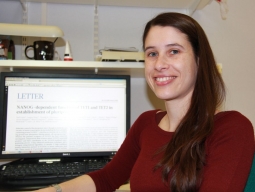|
|
| Mechanism of reversion of adult cells into stem cells identified |
 |
Yael Costa, a Portuguese scientist at the University of Cambridge has identified a mechanism by which adult cells revert to stem cells. This work has been published in Nature... |
|
| Yael Costa, a Portuguese scientist at the University of Cambridge has identified a mechanism by which adult cells revert to stem cells. This work has been published in Nature and describes how Nanog, a protein that had previously been shown to be essential for this process, works together with the epigenetic regulators Tet1 and Tet2 to reprogram adult cells into a pluripotent state. The reprogramming process had been originally described by the Japanese scientist Shynia Yamanaka, to whom and for which the Nobel Prize for Medicine or Physiology has been awarded in October 2012. Reprogramming is a well established process, which was proven to be dependent on Nanog by the Portuguese scientist Jose Silva, also a former GABBA student. Now and for the first time, Yael’s work demonstrates that the molecular mechanism by which Nanog reverts adult cells into stem cells is by working together with two proteins that change DNA marks. This in turn makes genes change from “off” to “on”. It was known that changes to these DNA marks would lead to changes in the expression of genes, but only now has that been associated with reprogramming and Nanog, specifically as a consequence of its associations with Tet1 and Tet2. Yael Costa was a GABBA student from the 1999 edition. The work was developed at the Wellcome Trust – Medical Research Council Stem Cell Institute, University of Cambridge, UK in collaboration with a lab at the Mount Sinai School of Medicine in New York |
| Published in 2013-02-11 16:19:56 |
|
 |
|
 |
|
 |
|
 |
|
 |
|
 |
|
Program financially supported by
the National Foundation for
Science and Technology
|
|
 |
|



